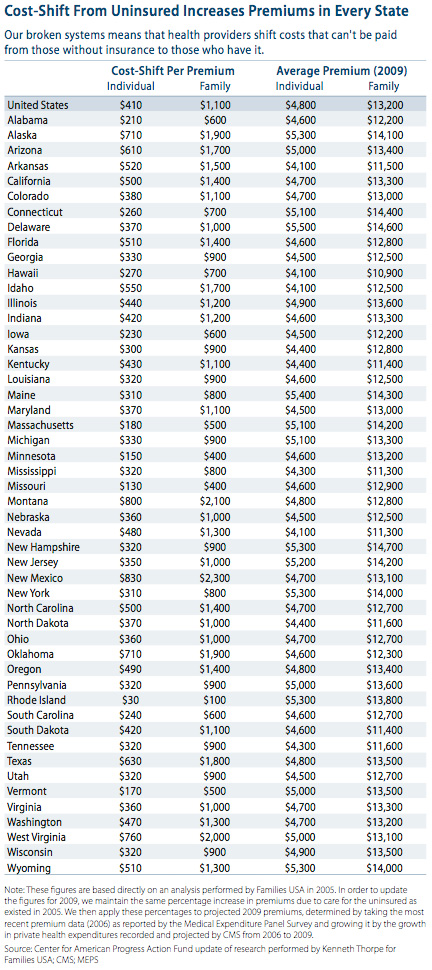Read the full memo (CAP Action)
America’s patchy health care system is leaving millions of people without continuous, affordable, and effective health insurance, and we’re all paying the price.
The Center for American Progress Action Fund has updated a 2005 analysis by Kenneth Thorpe for Families USA and found that, on average, 8 percent of families’ 2009 health care premiums—approximately $1,100 a year—is due to our broken system that fails to cover the uninsured.
The best way to address this burden on health insurance is to create a more efficient system that offers continuous, quality coverage for all. We can’t afford our broken system any more.
Discussion
Approximately 87 million people—one in three Americans—went without health insurance for some period during 2007 and 2008, while rising unemployment and job losses caused an estimated 14,000 people to lose their health insurance every day in December 2008 and January 2009 alone.
Some mistakenly believe that the plight of the uninsured, and America’s failure to provide continuous quality health insurance for everyone, only affects those who are unable to find health insurance. But this is wrong.
The uninsured pay more for care—and get less—than those with insurance. But when the uninsured cannot pay, health care providers shift those costs to those who can pay—those who have insurance coverage. This leads to higher premiums for those who buy their insurance on the individual market, as well as workers who get insurance for themselves and their families through their job.
This “hidden tax” on health insurance arises from a failure to continuously cover all Americans and accounts for roughly 8 percent of the average health insurance premium. This cost-shift amounts to $1,100 per average family premium in 2009 and $410 per average individual premium. By 2013, assuming the cost shift remains the same percentage of premium costs, the cost shift will be approximately $480 for an individual policy and $1,300 for a family policy.
The table below shows this “cost-shift” markup for health care plans in every state.

Methodology
Thorpe performed an analysis for Families USA in 2005 that quantified “the dollar impact on private health insurance premiums when doctors and hospitals provide health care to uninsured people.”
We maintained the same percentage increase in premiums due to care for the uninsured —the so-called “cost-shift” markup—that existed in every state in 2005 under Thorpe’s analysis. We then applied these percentages to projected 2009 premiums, which were determined by taking the most recent state-by-state premium data (2006, released in 2008) as reported by the Medical Expenditure Panel Survey, and grow them by the change in national private health expenditures recorded and projected by Centers for Medicare and Medicaid Services from 2006 to 2009.
Read the full memo
(CAP Action)